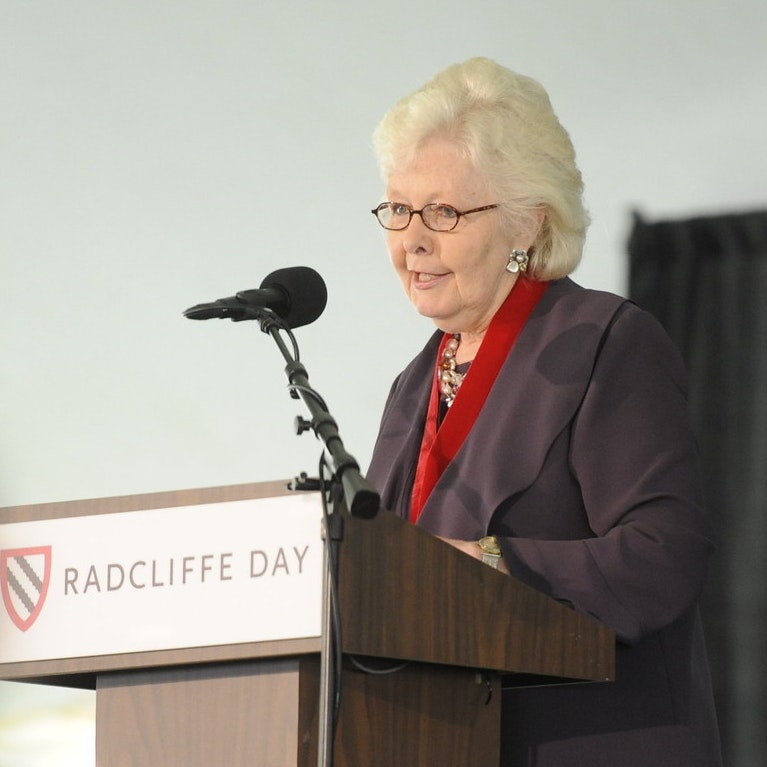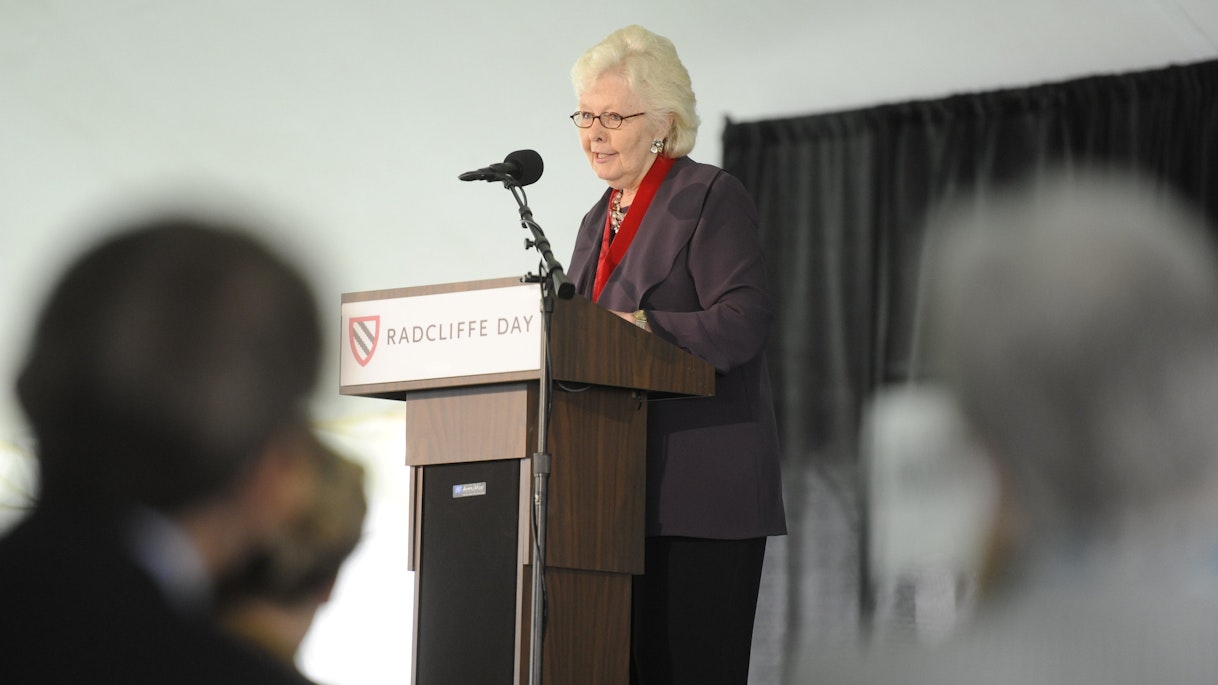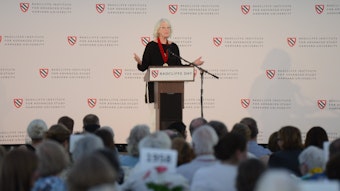Radcliffe Day 2012

This year’s Radcliffe Day is dedicated to exploring the law and social change.
At the morning panel, moderated by Harvard Law School Dean Martha L. Minow, the focus will be on recognizing significant accomplishments, discussing major court cases, and considering the possibilities and limits of the law in making social change. These themes continue into the Radcliffe Day Luncheon that follows, when Margaret H. Marshall will receive the Radcliffe Institute Medal, presented annually to an individual who has had a transformative impact on society. Marshall has been a force for justice and equality throughout her life, beginning with her years in South Africa and culminating in her service as the 24th chief justice of the Massachusetts Supreme Judicial Court.
Please join us under the tent in Radcliffe Yard and help us celebrate the appointment of Lizabeth Cohen as our dean.
Past Radcliffe Days have featured leaders in their fields, including feminist pioneer Gloria Steinem; the first woman to serve on the United States Supreme Court, Sandra Day O'Connor; and renowned novelist and critic Margaret Atwood.
Biographies
PANELISTS: From Front Lines to High Courts: The Law and Social Change
Jennifer Gordon joined the faculty of Fordham University School of Law—where she teaches courses on immigration law, labor law, public-interest law, and law and the economy—in 2003. In 1992, she founded the Workplace Project, a nationally recognized nonprofit worker center organizing immigrant workers, which lobbied successfully for a strong wage enforcement law in New York State.
She was a MacArthur Fellow from 1999 to 2004 and has won several awards, including the National Association for Public Interest Law (now Equal Justice Works) Outstanding Public Interest Lawyer of the Year award. Her publications include the book Suburban Sweatshops: The Fight for Immigrant Rights (Belknap/Harvard University Press, 2005) and articles such as “People Are Not Bananas: How Immigration Differs from Trade” in the Northwestern University Law Review (2010), “Strengthening Labor Standards Enforcement through Partnerships with Workers’ Organizations” in Politics and Society (with Janice Fine, 2010), “Rethinking Work and Citizenship” in the UCLA Law Review (with R.A. Lenhardt, 2008), and “The Lawyer Is Not the Protagonist: Community Campaigns, Law, and Social Change” in the California Law Review (2007).
She graduated magna cum laude from Radcliffe College, where she won the Fay Prize, and earned a juris doctor degree from Harvard Law School.
Professor of Law, Fordham University School of Law
Linda Greenhouse is the Joseph Goldstein Lecturer in Law and Knight Distinguished Journalist-in-Residence at Yale Law School. She assumed this position in 2009 after a 40-year career at the New York Times, including 30 years covering the United States Supreme Court.
At Yale, she is a member of the faculty of the Supreme Court Advocacy Clinic and teaches Supreme Court–related courses. She received numerous journalism awards for her reporting, including a Pulitzer Prize for beat reporting in 1998, a Carey McWilliams Award from the American Political Science Association in 2002, and the Goldsmith Career Award for Excellence in Journalism from Harvard Kennedy School in 2004.
Her newest book is The U.S. Supreme Court: A Very Short Introduction (Oxford University Press, 2012). Other recent publications include Becoming Justice Blackmun: Harry Blackmun’s Supreme Court Journey (Times Books, 2005) and, with Reva B. Siegel, Before Roe v. Wade: Voices That Shaped the Abortion Debate before the Supreme Court’s Ruling (Kaplan Publishing, 2010).
Greenhouse is one of two non-lawyer honorary members of the American Law Institute, which awarded her a Henry J. Friendly Medal in 2002. She is a graduate of Radcliffe College and a member of the Harvard University Board of Overseers and several other nonprofit boards, including the American Constitution Society. In 1978, she received a master of studies in law from Yale Law School, which she attended on a Ford Foundation Fellowship.
Senior Research Scholar in Law, the Knight Distinguished Journalist-in-Residence, and Joseph Goldstein Lecturer in Law, Yale Law School
Former Supreme Court reporter, the New York Times
Renée M. Landers is a professor of law at Suffolk University Law School and the faculty director of the school’s health and biomedical law concentration. She also teaches administrative law and constitutional law. Previously, she served as deputy general counsel for the US Department of Health and Human Services and deputy assistant attorney general in the US Department of Justice.
Landers has written about racial and ethnic disparities in health care, health care reform, same-sex marriage, and the status of women and people of color in the legal profession. In 2003–2004, she was the first woman of color and first law professor to become president of the Boston Bar Association. She is a former member and vice chair of the Massachusetts Commission on Judicial Conduct.
During her membership to the Harvard University Board of Overseers, Landers became its third woman president. She is a former member of the Radcliffe College board of trustees and former leader of the boards of the Big Sister Association of Greater Boston and board of overseers of the Shady Hill School. She currently serves on the boards of the National Academy of Social Insurance and WGBH and on the Radcliffe Institute’s Dean’s Advisory Council. Landers is a graduate of Radcliffe and a cum laude graduate of Boston College Law School.
Professor of Law, Suffolk University Law School
Martha Minow is the dean and Jeremiah Smith, Jr. Professor at Harvard Law School, where she has taught since 1981. She is an expert in human rights, especially those of members of racial and religious minorities and women, children, and persons with disabilities. Her scholarship has also addressed private military contractors, management of mass torts, transitional justice, and law, culture, and social change.
Minow has published more than 150 articles and several books, including In Brown’s Wake: Legacies of America’s Educational Landmark (Oxford University Press, 2010); Between Vengeance and Forgiveness: Facing History After Genocide and Mass Violence (Beacon Press, 1998); and Making All the Difference: Inclusion, Exclusion, and American Law (Cornell University Press, 1990).
She has also edited or coedited law school casebooks and books for a general audience. Nominated by President Obama and confirmed by Senate, Minow serves as vice chair of the board of the Legal Services Corporation. She is a member of the American Academy of Arts and Sciences and the American Philosophical Society, and her awards include the Albert M. Sacks–Paul A. Freund Award for Teaching Excellence at Harvard Law School, the Holocaust Center Award, and the Radcliffe Graduate Society Medal. A Phi Beta Kappa graduate of the University of Michigan and the Harvard Graduate School of Education, Minow received her law degree at Yale Law School before serving as a law clerk to Judge David Bazelon and Justice Thurgood Marshall.
Dean and Jeremiah Smith, Jr. Professor of Law, Harvard Law School
Kathleen M. Sullivan is partner and chair of the national appellate practice at Quinn Emanuel Urquhart & Sullivan, LLP, the first woman named partner at any Am Law 100 law firm. Now based in Quinn Emanuel’s New York office, Sullivan argues a wide variety of cases in the US Supreme Court and federal and state courts.
The National Law Journal has named her one of the 100 most influential lawyers in America. Also widely known as one of the nation’s most prominent constitutional scholars, Sullivan has had a long academic career as a professor of law at Harvard Law School and at Stanford Law School and, from 1999 to 2004, as dean of Stanford Law School—the first woman dean of any school at Stanford University.
She has been elected to the American Academy of Arts and Sciences and the American Philosophical Society. Sullivan holds a BA from Cornell University, where she was a member of Telluride House, an MA from the University of Oxford, which she attended as a Marshall Scholar, and a JD from Harvard Law School, where she won the Ames Moot Court Competition.
Partner, Quinn Emanuel Urquhart & Sullivan, LLP
Stanley Morrison Professor of Law and Former Dean, Stanford Law School
RADCLIFFE MEDALIST
Margaret H. Marshall is the former chief justice of the Supreme Judicial Court of Massachusetts. Born in South Africa, she earned a BA from the University of the Witwatersrand in Johannesburg and a master’s degree in education from Harvard University. After graduating from Yale Law School, she practiced law for 16 years in Boston before her appointment as vice president and general counsel of Harvard University in 1992. She was appointed to the Supreme Judicial Court in 1996 and became chief justice in 1999, the first woman to hold that position.
During her 14 years on the court, Marshall wrote more than 300 opinions, many of them groundbreaking—including the 2003 decision inGoodridge v. Department of Public Health, which declared that the Massachusetts Constitution prohibits the state from denying same-sex couples access to civil marriage. The ruling made Massachusetts the first state to legalize gay marriage. Marshall is a member of the council of the American Law Institute and a fellow of the American Academy of Arts and Sciences. The recipient of numerous honorary degrees and professional awards, she has published many scholarly articles on judicial independence and the role of state courts in the United States.
Event Videos

From Front Lines to High Courts: The Law and Social Change

Radcliffe Medalist Margaret H. Marshall


